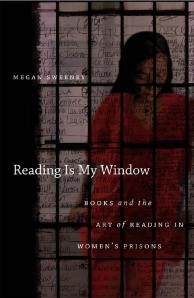Recent Author's Forum discusses the value of books in women's prisons

Published by the University of North Carolina Press.
For Sweeney's new book, she interviewed 94 women prisoners in North Carolina, Ohio and Pennsylvania about what they read, why, and what meaning reading has for each of them. Sweeney provided a few of the reasons why she wanted to pursue this research — she wanted to know about people who live outside the usual daily frame of reference and to show people's lives as textured, versus presenting a reductive view of women prisoners.
Many of the books available to women in prison fall into three categories: African-American urban fiction, such as "Thong on Fire" or "A Project Chick"; novels or memoirs that focus on victimization and survival, such as Jeannette Walls' "The Glass Castle"; and books of self-help —those by televangelist Joyce Meyer are particular popular. Sweeney points out that these books rise in popularity as other types of reading material become less available. For example, the libraries in the prisons she visited were entirely funded by the profits of vending machines — no other funds were allocated. In addition to economic constraints, judicial rulings also factor into the type of materials available. In 2006 the U.S. Supreme Court ruled, in Beard v. Banks, that it is constitutional for a Pennsylvania prison to deny secular newspapers on the grounds that the lack of papers will serve as an incentive for personal growth.
In her research, Sweeney found that some women preferred books that were accessible — in that they used common vernacular and provided a connection for prisoners to the outside world of the latest cultural trends. This allowed readers to see themselves in the novel — and for discussion of their actions and their feelings surrounding them. As Sweeney put it, the women prisoners map their own interiority onto the characters.
Mary Heinen followed, speaking personally about how valuable reading and access to materials were for her while in prison. Books allowed her to believe in a better world than the one she was living in and they fostered connection, "[it was] important to have something in our hands to relate to, to communicate with...." And books, magazines, newspapers all allowed women to communicate better with each other.
These are just some of the highlights of the event; the next Author's Forum is March 9.
The Author's Forum is a collaboration between the U-M Institute for the Humanities, University Library, Great Lakes Literary Arts Center, and Ann Arbor Book Festival. Additional sponsorship for this event provided by the Departments of Afroamerican & African Studies, English, Women's Studies; and the Prison Creative Arts Project.
Julia Eussen received her B.A. in English from Kansas State University. She is currently a graduate student in Eastern Michigan University's Professional Writing Program. She is also an active member of the Ann Arbor Classics Book Group and has recently begun to re-acquaint herself with good poetry. She can be reached at jeussen at emich dot edu.

